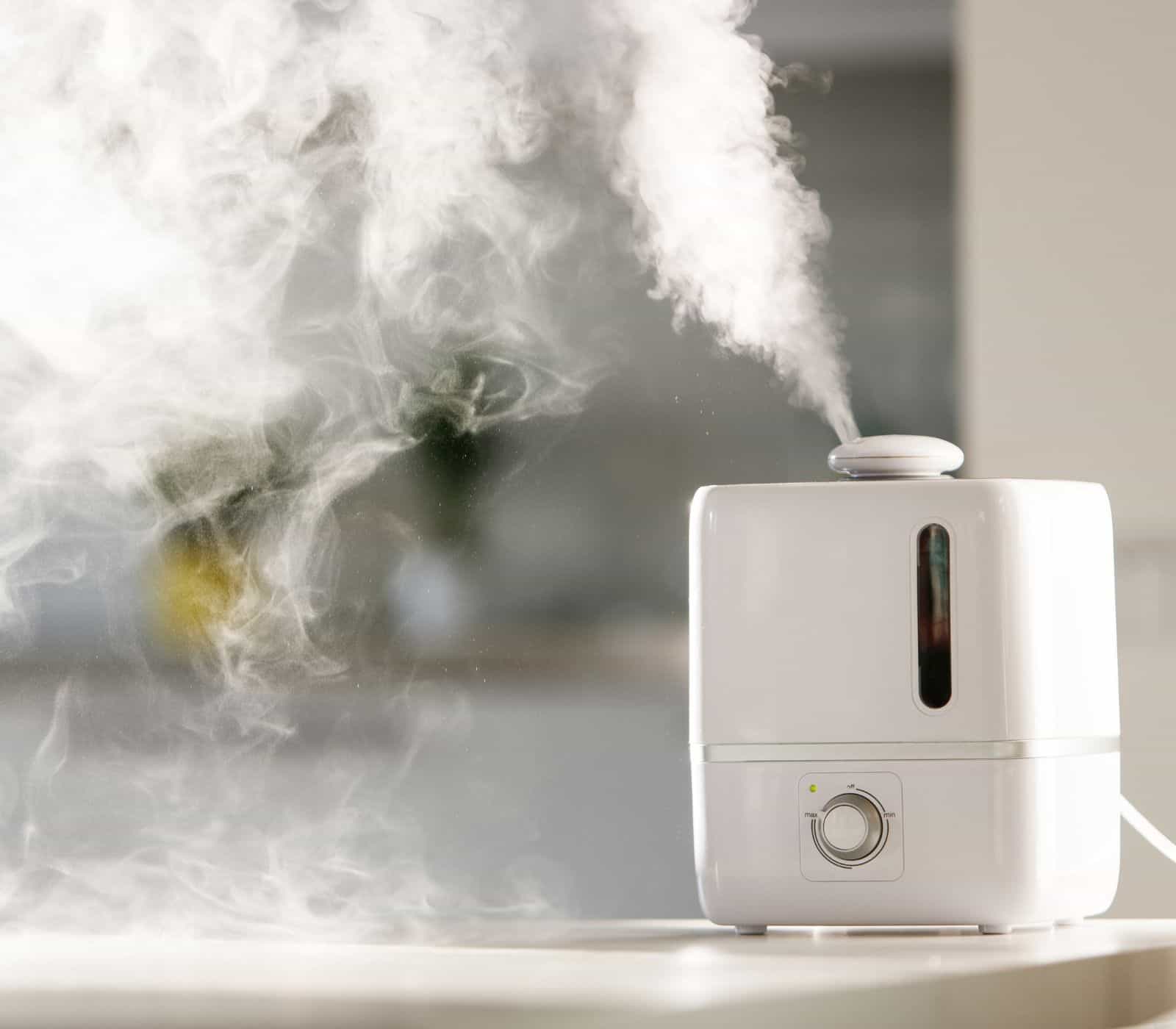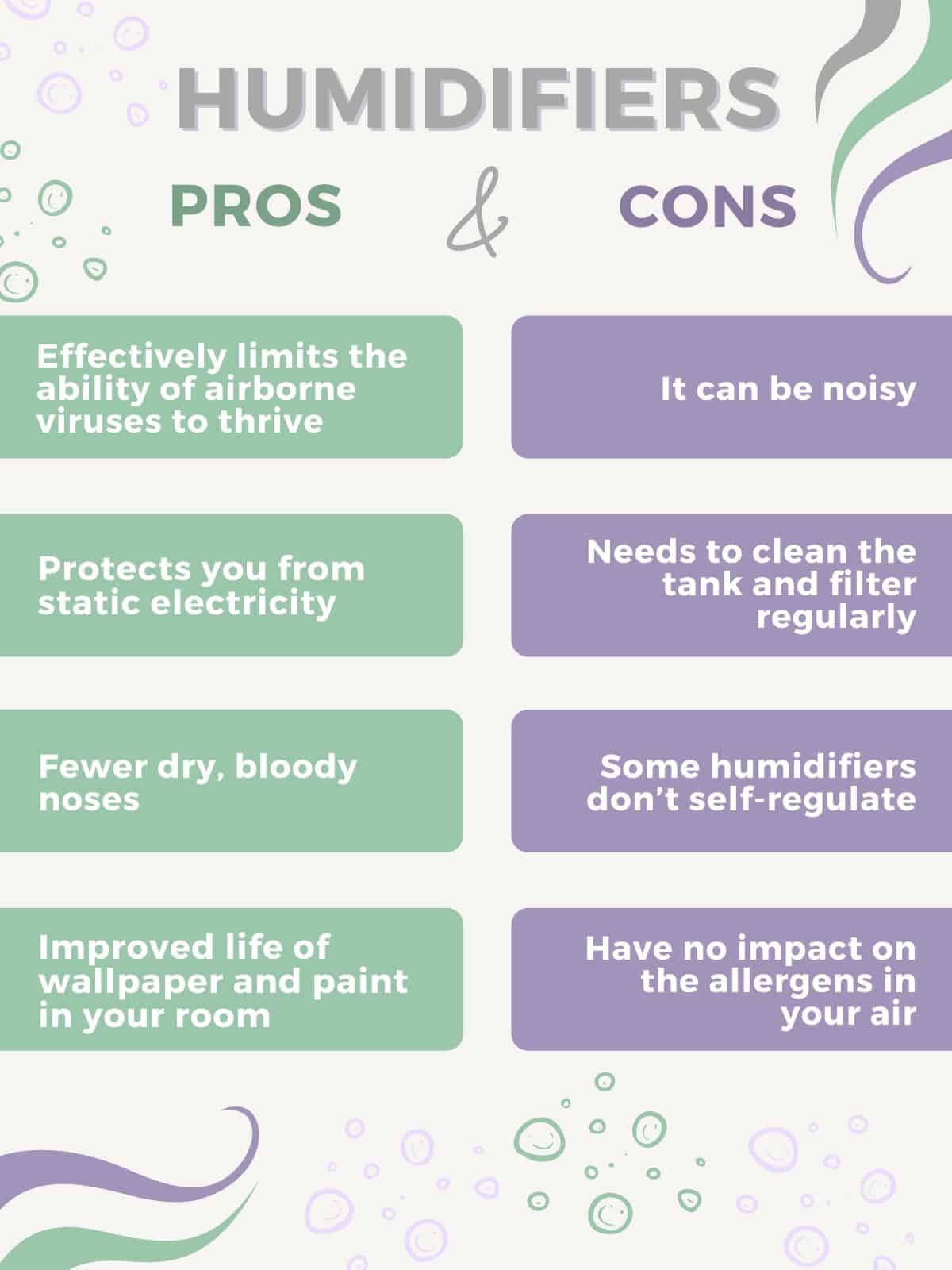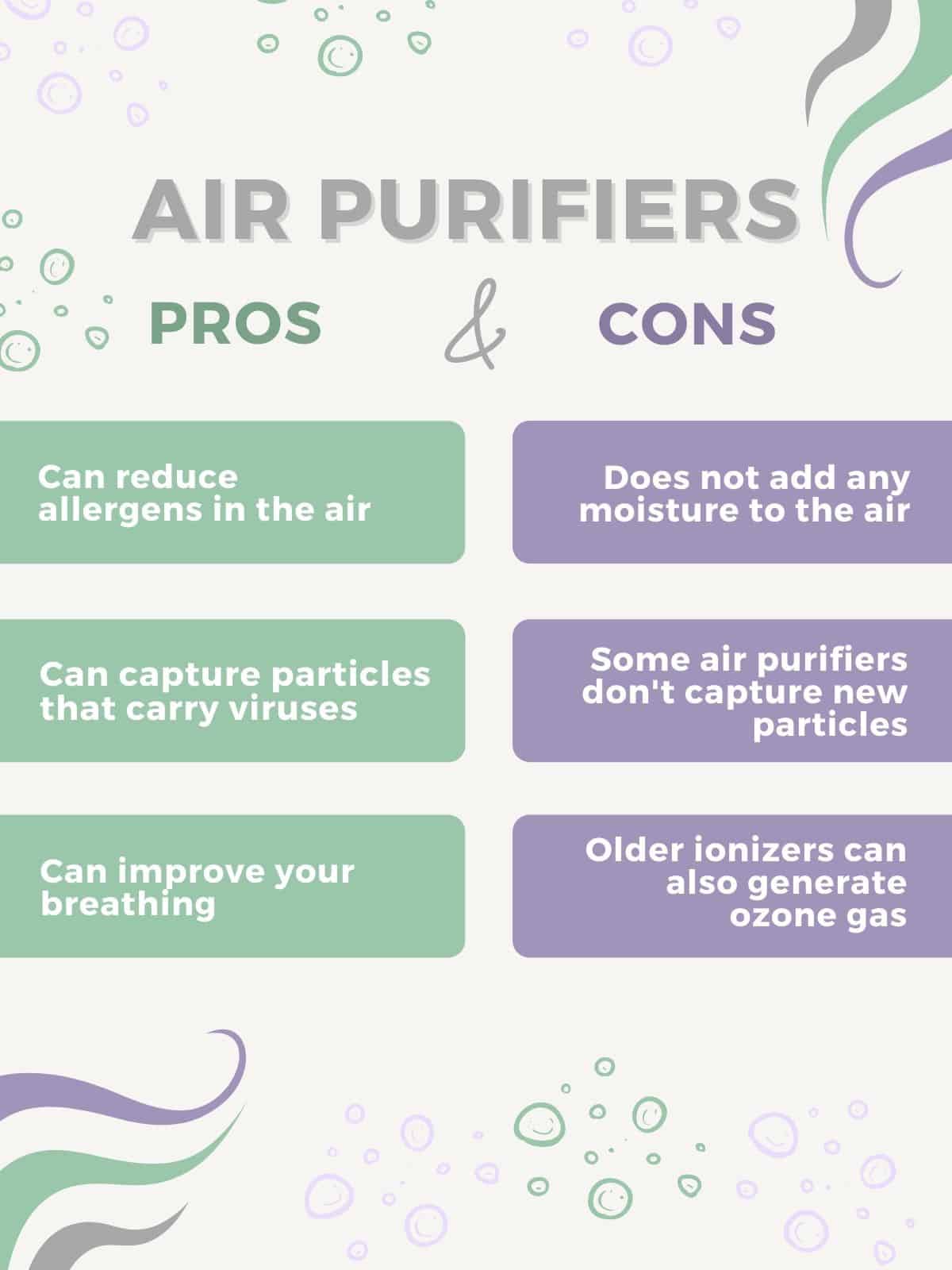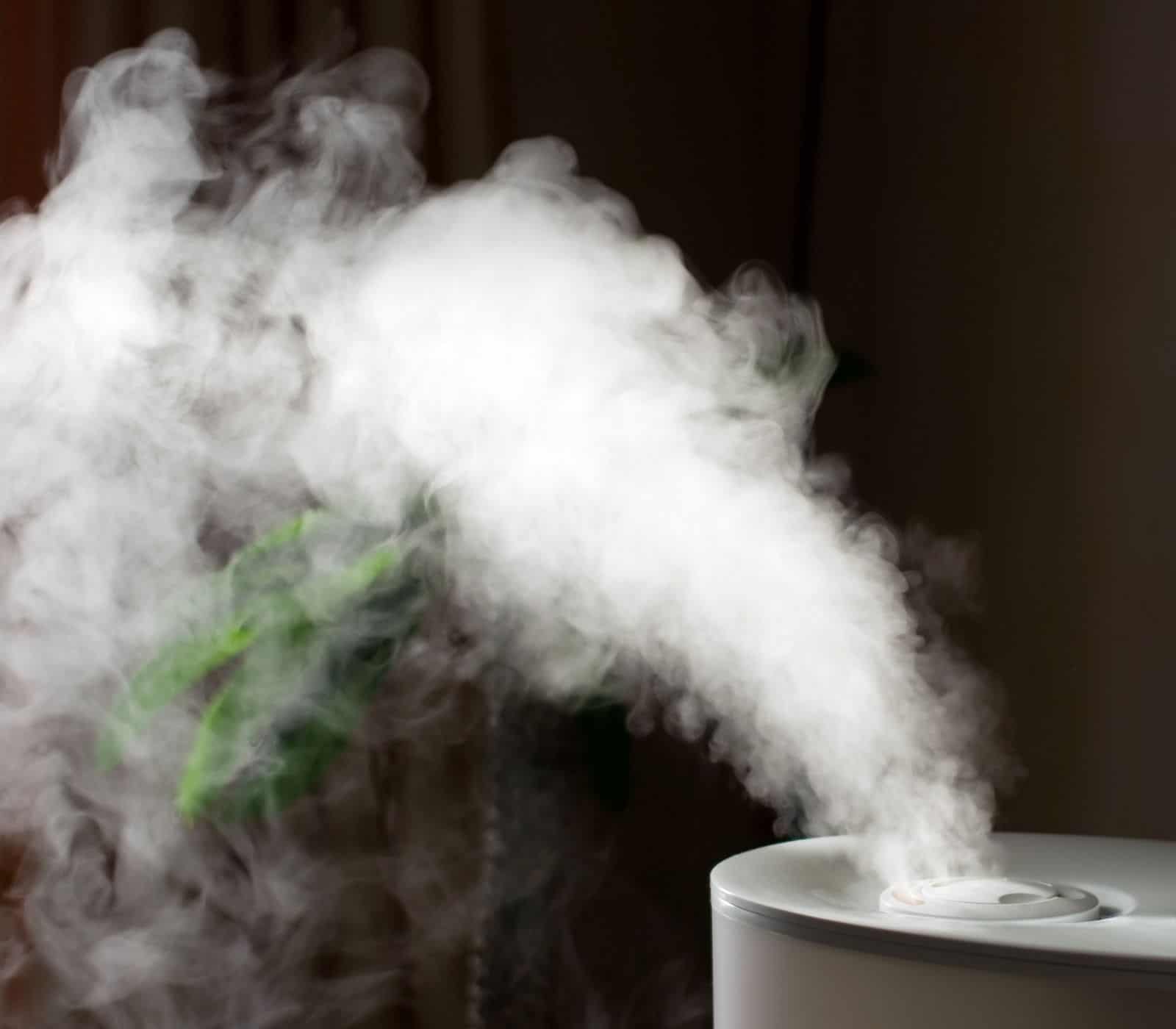While humidifiers and air purifiers may seem similar, they actually offer different benefits and serve different purposes. When weighing the pros and cons and comparing getting a humidifier vs an air purifier, you should carefully consider your needs to determine which is best for you.
Both impact the air you breathe, but in very different ways. Read on to find out how each device works, when to use each appliance, and the pros and cons of each.
Read about the differences between oil diffusers and humidifiers.

An air purifier and a humidifier are two different devices that serve different purposes in improving indoor air quality.
An air purifier is a device that helps to remove impurities from the air, such as allergens, dust, smoke, and pet dander. It works by pulling air through a filter or series of filters, which trap these particles and prevent them from circulating in the air. Air purifiers can be helpful for individuals with allergies or respiratory issues, as well as those who want to improve the overall air quality in their home.
On the other hand, a humidifier is a device that adds moisture to the air. It can be helpful in dry climates or during the winter months when indoor heating can dry out the air, leading to dry skin, irritated nasal passages, and other respiratory issues. A humidifier can also help to ease symptoms of allergies and asthma by moistening the airways.
While both devices can improve indoor air quality, they serve different purposes and should not be used interchangeably. In fact, using a humidifier without proper maintenance can actually lead to the growth of mold and bacteria, which can worsen respiratory symptoms. It’s important to follow the manufacturer’s instructions for both devices, regularly clean and replace filters, and use them only as directed to ensure the best results.
Pros and Cons of Humidifiers
Air humidifiers release moisture into the air, which offers a bevy of benefits. They include:
- Effectively limits the ability of airborne viruses to thrive, as they do better with dry indoor air.
- Protects you from static electricity – from clingy skirts to static electricity hair. Additionally, sparks of static can damage your electronic devices, like your computer – humidifiers can help you avoid this issue, as well.
- Fewer dry, bloody noses.
- Improved life of wallpaper and paint, which tend to peel in dry conditions.
- Thriving indoor plants, many of which need more than 23% humidity when temperatures go below freezing.
There are a few cons to air humidifiers. For one, they can be noisy, though some are quieter than others. You’ll also need to clean the tank and filter regularly to avoid the growth of bacteria and fungus. Some humidifiers don’t self-regulate, which means you could have excess moisture in your home.
They also have no impact on the allergens in your air. Finally, humidifiers can cause white dust – minerals that are evaporated into water and fall in your home. You can easily avoid this by using distilled water.

Pros and Cons of Air Purifiers
On the other hand, air purifiers remove allergens and contaminants from your indoor air. They kill germs, pollutants like smoke and pet dander, mold spores, dust mites, bacteria, viruses (including H1N1 swine flu), mildew, fungus like black mold (not to be confused with chlordane), pollen, particles of pollution including cigarette smoke and car exhaust.
Air purifiers are excellent at removing the tiniest contaminants in your air because they don’t just filter but also use a three-stage system that removes up to 99% of all particles 1 micron or larger , which includes everything from common plant pollens to viruses down to 0.
- Can reduce allergens in the air, like pet dander, pollen, mold, and dust mites.
- Can capture particles that carry viruses, protecting you from colds or the flu.
- Improved breathing, which can help your skin and sleep quality.
Air purifiers don’t add any moisture to the air, so they can’t help with dry air. Additionally, new particles are always emerging, and some air purifiers may not be able to capture as much as they say they can. Older ionizers can also generate ozone during operation, which can make symptoms of asthma worse. However, it’s important to note that many manufacturers say that newer models don’t have this issue.
When Should You Use a Humidifier?
Humidifiers are great in the winter months as they combat the dry, heated air we pump our homes with. If you experience dry skin, nose, and hair during these months – which most of us do – you’d benefit from a humidifier.
Humidifiers can also be great for babies. Per the FDA, a cool-mist humidifier can be good for infants with cold symptoms, such as a cough, by helping them breathe easier and shrinking their nasal passages. Humidifiers can also protect the baby from having a scratchy or dry throat and nose. Be sure to avoid warm air humidifiers in the nursery, as they can have adverse effects and cause nasal passages to swell.
If you have asthma, you may actually want to avoid getting a humidifier. Higher humidity levels can trigger asthma attacks because humidity sometimes causes the growth of mold, bacteria, and dust mites. Though a humidifier can help if your asthma is triggered by dry air, it’s likely more beneficial for you to go with an air purifier instead.

When Should You Use an Air Purifier?
Air purifiers are especially great for people who spend the majority of their time indoors, at home as they reduce pollutants in the air. Whether you’re an adult or baby, you’ll benefit from the removal of allergens, asthma triggers, mold spores, pollen, pet dander, tobacco smoke, and more – all of which are potential respiratory irritants.
If you suffer from allergies, an air purifier can greatly improve your quality of life as it removes your triggers from the air. If you suffer from asthma, you might also benefit from an air purifier. Since a purifier can remove pollutants that often bring on asthma attacks, it can help you breathe easily year-round.
How To Use A Humidifier
Humidifiers are fairly simple to operate, though there is a good deal of maintenance involved. First, it’s important that you monitor the humidity in a room with a hygrometer (if your humidifier doesn’t have a built-in meter) and avoid adding too much moisture. You never want a room to exceed 50% humidity, as mold and bacteria can grow in that climate.
Be sure to use distilled water only, as regular water contains minerals that can be released by the humidifier. Keep interior doors open, so that the humidity can flow throughout your space.
Finally, be sure to replace your filters regularly and clean the humidifier after each use to avoid standing water, which can contain mold, bacteria, and fungi.
Make sure you place your humidifier on a table as opposed to the floor. Read this article to know the BEST places to place your humidifier at home.

How to Use an Air Purifier
Ultimately, choosing a humidifier vs air purifier comes down to your specific needs. You may also run both at the same time, but you’ll need to ensure you place them an adequate distance from each other for each to run effectively. Whichever you decide on, you’re taking an important step for your health by protecting your indoor air quality.
In Conclusion
Air purifiers are especially great for people who spend the majority of their time indoors, at home as they reduce pollutants in the air. Whether you’re an adult or baby, you’ll benefit from the removal of allergens, asthma triggers, mold spores , pollen, pet dander , tobacco smoke , and more – all of which are potential respiratory irritants. If you’re a teacher, consider adding one to your classroom.
If you suffer from allergies, an air purifier can greatly improve your quality of life. If you suffer from asthma, you might also benefit from an air purifier. Since a purifier can remove pollutants that often bring on asthma attacks, it can help you breathe easily year-round.
However, if your situation is less extreme than Asthma or Allergies, you are better off with a humidifier. For example, babies can sometimes benefit from the added moisture in the air that is caused by the humidification of their room.
Other Articles You Might Like
15 Essential Oils To Boost Your Immune System
